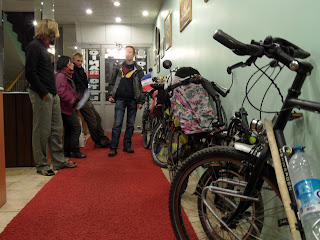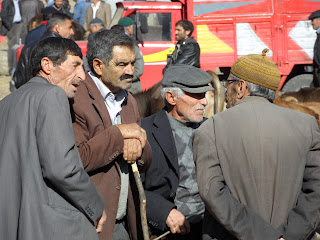 |
| Who needs a conference room when you have a hotel lobby? |
Life used to be pretty straightforward for overlanders traveling from Turkey to eastern Asia: head to the dreary border town of Doğubeyazıt, situated at the foot of Mount Ararat, draw a more or less diagonal line between Iran's northwest and southeast, cross into Pakistan, and then go wherever your fancy takes you, be it the northern road to China or the eastern one to India. A classic route that is all but history due to Pakistan's recent crackdown on
—no, not the local chapter of Al-Qaeda loonies
—but happy-go-lucky travelers eager to explore the marvels of the country. Visa applications can now only be filed in the country of origin. And rightly so, of course. Those blasted hippies collecting visas as they go simply can't be trusted.
With the arrival of no less than four cyclists, the atmosphere at the hotel in Erzurum took on a distinct quality of nervous apprehension. All of them
—the French couple on their recumbents, the French boy they had picked up along the way, the ginger software developer from Südtirol
—had given up any hope they had of traversing Pakistan. Too much of a hassle. That put them in a tight spot, and they knew it. Once you've entered Iran your exit options are limited. Central Asia, though beautiful, is far too cold in winter and makes Pakistan look like Luxembourg when it comes to granting tourist visas. The only alternative, Afghanistan, is out of the question for obvious reasons.
 |
| Best time to visit the Georgian valleys: autumn |
There is a backdoor, however, a plan so cunning you could stick a tail on it and call it a weasel. (Now, who said that again...) The only drawback is that this workaround is still in beta. The idea is to catch a ferry from Iran to Dubai and then hitch a ride on a cargo ship bound for India. Gavin, the English cyclist I wrote about in the Black Hole entry, bravely decided to give it a shot. As far as I know he got stuck in Dubai and is now desperately roaming the docks looking for a captain willing to take him aboard.
For me, the Dubai route is merely a backup, something to consider if all else fails. I've got my mind set on cycling the Karakoram Highway, a 1300-kilometre high-altitude roller-coaster ride linking Pakistan and China. Apart from the visa drivel there is just one complicating factor. The road is officially closed from the first of January till the first of May. If snowfall persists, that date could be pushed back. Unwilling to bet on too many visa extensions
—thirty days are standard for both Iran and Pakistan
—I've got some serious time to kill before entering Iran. That's why I'm crossing Turkey like a snail on the back of a turtle, using up the full ninety days I've been allowed. To top it off, I will even make a little detour through the Caucasus. It felt a bit strange to head north while my cycle buddies were in a hurry to get to the Persian Gulf, where the average midday temperature in December sits around a pleasant twenty degrees.
 |
| Farmers on a livestock market in Akşar |
So far, I can't say I regret the decision. The area north of Erzurum used to be part of medieval Georgia. No wind-swept steppes here, but lush valleys, sometimes narrowing to a gorge, studded with the eerie remains of castles, churches and monasteries. Winter hasn't yet reached this remote corner of Turkey. Autumn reigns, painting the leaves of the trees lining the roaring streams in outrageous yellows, oranges and reds.
Thanks to my host Veysel I get to see every nook and cranny of the Georgian valleys. He is a vet, and I often join him when he is needed at one of the farms in the neighbouring villages. Circumstances in these communities are primitive at best, but that doesn't deter Veysel. It's a treat to watch someone do his job with such ease and confidence. Without batting an eyelid he stuffs a two-metre hose in the backside of a constipated cow, or stitches up a giant Kangal dog with a flesh wound the size of a baseball mitt
—the result of a quarrel with a wild boar. Never a dull moment, in other words. If contemporary Georgia is only half as mesmerising as its medieval counterpart, I'm in for a good one.










